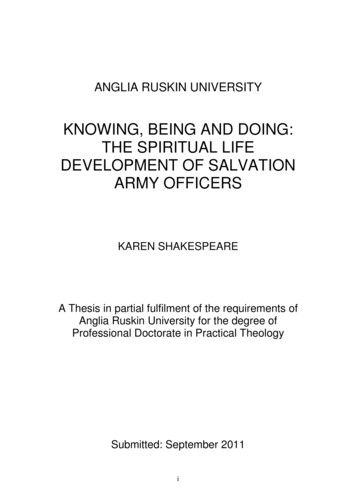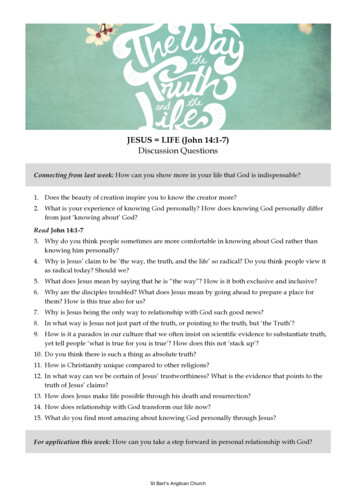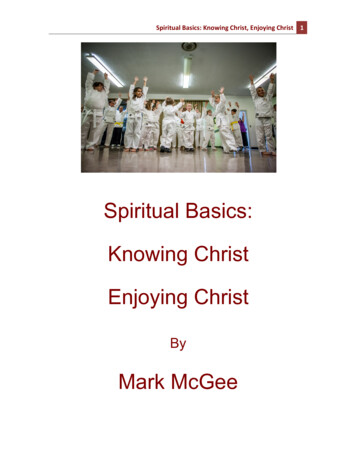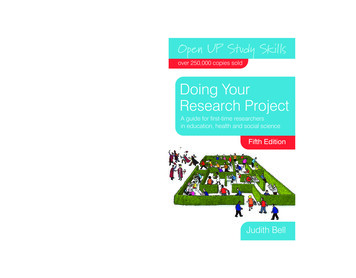
Transcription
ANGLIA RUSKIN UNIVERSITYKNOWING, BEING AND DOING:THE SPIRITUAL LIFEDEVELOPMENT OF SALVATIONARMY OFFICERSKAREN SHAKESPEAREA Thesis in partial fulfilment of the requirements ofAnglia Ruskin University for the degree ofProfessional Doctorate in Practical TheologySubmitted: September 2011i
With thanks toSalvation Army officer colleagues who have shared their experience of spiritual lifedevelopment by participating in the formal research through questionnaires andinterviews, and informally in conversation and group discussions. Their stories haveenriched and broadened my understanding.The Salvation Army United Kingdom with the Republic of Ireland Territory whichactively encourages officers to undertake postgraduate study and for the provision offinancial support for this research.Friends who have listened, discussed and offered suggestions.Staff associated with the Professional Doctorate in Practical Theology at theCambridge Theological Federation who have offered expertise during study days andwise words in personal conversation.My supervisors:Dr Helen Cameron, whose incisive intellect and breadth of knowledge havesharpened and challenged my thinking, and whose positive spirit has inspired andmotivated me.Zoë Bennett, both course leader and supervisor, for practical and academicguidance. She has never failed to ask penetrating questions which have enabled meto refine and expand my research.And toNaomi and John, Ellie and Mark for their consistent interest in my work andencouragement.David, who always supports, encourages and helps me to believe that it can bedone!i
ANGLIA RUSKIN UNIVERSITYABSTRACTFACULTY OF ARTS, LAW AND SOCIAL SCIENCESPROFESSIONAL DOCTORATE IN PRACTICAL THEOLOGYKNOWING, BEING AND DOING: THE SPIRITUAL LIFE DEVELOPMENTOF SALVATION ARMY OFFICERSBy KAREN SHAKESPEARESeptember 2011This research is rooted in my professional practice at the newly establishedinternational Centre for Spiritual Life Development (CSLD) of The Salvation Army. Itis designed to develop a foundation which can shape and enhance the policy andprovision of the CSLD. It seeks to answer two questions: How do Salvation Armyofficers sustain and develop their personal spiritual life in the context of an activist,missional organisation? In what ways can the Centre for Spiritual life Developmentfacilitate and support this process?The research methodology is qualitative, bringing responses to a writtenquestionnaire and semi-structured interviews into mutual critical dialogue with theconceptual framework, which is drawn from the theology and history ofevangelicalism and evangelical spirituality, and the theory of theological andvocational education. This has generated a rich description of spiritual lifedevelopment in Salvation Army officers in the 21st century, leading to newunderstanding.The empirical research focused upon a particular constituency, delegates to theInternational College for Officers, thus facilitating understanding of the differenceencountered in an organisation that has both global and local influences. It confirmedan expected diversity of understanding and practice in three major areas; definitionsof, and practices leading to, spiritual life development; the means used by officersdevelop their spiritual lives; and the relationship between practice and the spirituallife.The work contributes to academic knowledge about The Salvation Army by locatingthe organisation, and Salvationist spirituality, within the framework of evangelicalism.A proposal to encourage a holistic understanding of spiritual life development using aprocess of reflection based upon the integration of, and interrelationships between,‘knowing, being and doing’, offers a way forward that is applicable in a range ofcontexts. The evolution of my professional practice during the period of the researchdemonstrates that the foundations of new policy and practices are taking shape. Ittherefore contributes to the field of practical theology, as the integration and mutualcritique of practice, spirituality and educational theory have led to new understandingand new practice.Key words:Spiritual life developmentThe Salvation ArmyEvangelical spiritualityTheological educationii
Knowing, being and doing: the spiritual life development ofSalvation Army officers.ContentsIntroduction11The Salvation Army context112The Salvation Army and evangelicalism253The Salvation Army and evangelical spirituality354Education for ministry535Research design736Challenges encountered relating to the global context of the research917Research findings and discussion: understanding of spiritual lifedevelopment1008Research findings and discussion: ‘means of grace’ and spiritual lifedevelopment in Salvation Army officers1109Research findings and discussion: spiritual life and practical ministry12210Knowing, being and doing: a proposal for Salvation Army spiritual lifedevelopment130Conclusion143Reference list153iii
AppendicesAStage 1: Paper 1. Literature review: context, competencies andtheological education.172BStage 1: Paper 2. Training men to be like us: the aims and prioritiesof Salvation Army officer training, 1978-2008.204CStage 1: Paper 3. Investigating and facilitating the spiritual lifedevelopment of Salvation Army officers.231DThe report the International Spiritual Life Commission: Called to beGod’s People256EAnnual Spiritual Life Report269FThe Doctrines of The Salvation Army270GThe research questionnaire272HSummary of questionnaire analysis278ISample diagnostic tool292iv
Detailed Contents1Introduction1The research problem and boundaries2My context4Spiritual life development and practical theology6A gap in knowledge8A professional doctorate9The Salvation Army context11History and governance11Women in ministry14A missional focus15Activism15Education16The International Spiritual Life Commission17The Centre for Spiritual Life Development19For such as time as this 19Current provision for officer spiritual life development in The Salvation 22Army2Spiritual formation in officer training22Post-commissioning spiritual formation23The Salvation Army and evangelicalism25The marks of onism29Activism29Contemporary criticisms of evangelicalism in relation to The Salvation 31Army3The Salvation Army and evangelical spirituality35Evangelical spirituality35v
Salvationist spirituality438The call to worship40The call to God’s word41The call to the mercy seat41The call to celebrate Christ’s presence42The call to soldiership44The call to the inner life45The call to our life together45The call to our life in the world46The call to cultivate faith47The call to holiness48The call to war50The call to the family5153Education for ministryHabitus54The importance of habitus to the spiritual life57development of Salvation Army officersThe organisational model of The Salvation Army58‘A permanent mission to the unconverted’59Fostering and developing habitus60The philosophy of Salvation Army officer training and vocational61educationThe philosophy of Salvation Army officer training61Spiritual development61Education62Field operations62A vocational model of training63Vocational learning64Pastoral imagination65Reflective models of learning66Theological reflection in ministerial training67The reflective practitioner68Theological education in the Anglican communionvi69
5Research design73Psychological approaches to faith development73Historical survey75Interpreting the present76Qualitative research - an inductive methodology76Theology and inductive research78Critical realism79A practical doctorate, qualitative research and faithful80conclusionsResearch methods and process67881The research environment81The research subjects83The research process83The results86Limitations86My role as a researcher87Challenges encountered relating to the global context of theresearch91The questionnaire – demographics91The questionnaire - language92Competence in English92Translation of responses94The interviews95The results in relation to the global context96Research findings and discussion: understanding of spirituallife development100Spiritual life development100Advice for developing the spiritual life104Evidence of a developing spiritual life107Research findings and discussion: ‘means of grace’ andspiritual life development in Salvation Army officers110Significant factors in the training experience111vii
9Factors in ongoing spiritual development113Most significant impact116Provision by territories and commands118Research findings and discussion: spiritual life and practicalministry122A mutual relationship?123Practice and Theology124Practice as one of the most significant factors in spiritual life125development10Spiritual development as useful for ministry127Practice as a negative factor128Knowing, being and doing: a proposal for Salvation Armyspiritual life development130Habitus131A three-faceted approach132Knowing: understanding our faith133Being: who we are in connection with God135Doing: the practical implications137Integration and blending - a whole life perspective139Reflective practice139Practical considerations141A benchmark for policy and practice141Conclusion143Review of the empirical research process143Summary of findings144Definitions and development144Means of grace144Spiritual life and practical ministry145Answering the research questions145Reflections on my intellectual journey146Developments in my professional practice147The way forward for the CSLD149Contribution to knowledge149viii
Limitations150Possibilities for further research151Reference list153AppendicesStage 1: Paper 1. Literature review: context, competencies andtheological education.172BStage 1: Paper 2. Training men to be like us: the aims and prioritiesof Salvation Army officer training, 1978-2008.204CStage 1: Paper 3. Investigating and facilitating the spiritual lifedevelopment of Salvation Army officers.231DThe report the International Spiritual Life Commission: Called to beGod’s People256EAnnual Spiritual Life Report269FThe Doctrines of The Salvation Army270GThe research questionnaire272HAnalysis of responses278ISample diagnostic tool292Aix
COPYRIGHTAttention is drawn to the fact that copyright of this thesis rests with(i)Anglia Ruskin University for one year and thereafter with(ii)Karen Shakespeare(iii)The Salvation ArmyThis copy of the thesis has been supplied on condition that anyone who consults it isbound by copyright.x
IntroductionThe well stocked shelves of the library in William Booth College, London, provide arich resource for the students, all of whom are training to be Salvation Army officersin the United Kingdom and Europe. Annual investment, careful selection of booksand electronic resources, and the services of a full time librarian have enabled it tobecome a valuable source of information, formation and, sometimes, transformation.In addition many students buy their own books, often purchasing extra bookcasesduring their time as a student in order to house their growing personal resourcecollection. At the College for Officer Training in Harare the library is housed on onewall of a classroom and these few books are the sole access to resources for asimilar number of students. They are proudly displayed to visitors. There is simplynot enough money to purchase an extensive library stock, nor is it feasible forstudents to buy their own copies. Yet the students at both institutions will becomeSalvation Army officers; they will be required to teach and lead their people and theyneed to develop and resource their ministerial practice and spiritual life. As officersthe requirements of their ministry may be similar, and in time they may even workalongside one another as colleagues, but their preparation for officership, althoughgrounded in common principles (The Salvation Army (TSA)1 2005), will have beenvery different. Similarly their experiences of subsequent opportunities for spirituallife development will vary immeasurably, yet for each it is foundational to who theyare, what they believe and what they do.The Salvation Army is both global and local, so that similarity and difference, unityand diversity are part of its culture and tradition. It may be encountered as a localchurch; the community centre where an affordable meal and second hand clothing isavailable; an NGO working to alleviate the results of a natural disaster or war; theparent body of a school, hospital or care home; or a provider of services for the mostmarginalised in society. Each of these is accurate in some contexts and allexpressions find a common foundation and motivation in the international missionstatement.1Throughout the thesis there are many references to official Salvation Army publications which, byconvention, do not name individual authors or editors. For ease of reading, in-text references willcontain the initials TSA to refer to documents listed as authored by The Salvation Army in thereference list.1
The Salvation Army, an international movement, is an evangelical part of theuniversal Christian Church. Is message is based on the Bible. Its ministry ismotivated by love for God. Its mission is to preach the gospel of Jesus Christand meet human needs in his name without discrimination (TSA 2010a: frontpage).Although linked to International Headquarters by a common mission and foradministrative purposes, the worldwide Salvation Army is marked by considerablediversity. Differing cultural traditions and varying levels of resources ensure widevariety despite common ground. It is primarily a Christian community with anemphasis upon outward movement to the world, particularly to the poor andmarginalised. Leadership is provided by Salvation Army officers, ordained full timeministers who are appointed by the organisation to a role.This research focuses upon the spiritual life of Salvation Army officers and seeks toanswer two questions.How do Salvation Army officers sustain and develop their personal spirituallife in the context of an activist, missional organisation? In what ways can theCentre for Spiritual Life Development facilitate and support this process?The research problem and boundariesThere are two ways of being a member. Soldiers make a commitment to Christiandiscipleship within The Salvation Army, including foundational beliefs and lifestylechoices. There are also adherent members who having made a profession of faithchoose to recognise their association with the denomination in a formal way whichdoes not involve the commitments of soldiership. Many thousands of people attend,but have no recorded membership. Officers are soldiers who have responded to afull time vocation to Christian ministry and, following training at one of the fifty seventraining colleges, have been commissioned and ordained within the denomination.As of 31 December 2010, statistics record 1,132,823 soldiers, 176,226 adherents,and 26,329 active and retired officers worldwide (TSA 2011).The Centre for Spiritual Life Development (CSLD) is a small centre which wasestablished by The Salvation Army in July 2008 at the International College forOfficers (ICO) in London. Its primary aim is to broaden the influence of the ICObeyond its primary purpose, which is to provide an eight week opportunity forspiritual renewal, study and reflection for twenty six officers, four times each year.2
For many officers this is a welcome retreat in the mid years of ministry, which isseen as a privilege and is highly valued as a unique opportunity for personal growthand professional development.The CSLD mission statement has a main aim with three clear foci:The Centre for Spiritual Life Development exists to facilitate the developmentof the spiritual lives of Salvationists by Offering conferences and events that are spiritually enriching and thathelp form people in Christlikeness;Providing resources to cultivate spiritual life development;Encouraging implementation of intentional and systematic spiritual growththroughout the international Salvation Army (TSA 2009c, Munn 2009:7).The Centre was established with only one part-time member of staff, the Secretaryfor Spiritual Life Development, who is also the Associate Principal of the ICO. Myappointment, in August 2009, as Executive Assistant to the Secretary for SpiritualLife Development, is also part of a portfolio. The centre is also limited by budget andthe times when the ICO facilities are available for use. Some of the work isadministrative - monitoring and giving support to Salvation Army territories - but it isevident that in order to make effective provision to achieve the mission, carefulstrategic planning is required.Since 2008, developments have taken place in all areas of the mission statement.An initial, one week, conference for prayer leaders was held in September 2009, atwo week holiness seminar for twenty-six young adults preceded a world youthconvention in Stockholm in July 2010, and a conference for Territorial Secretariesfor Spiritual Life Development took place in September 2010. Resources linked tothe CSLD are emerging. These include articles in The Officer, a bi-monthlymagazine with a world-wide circulation, the publication of two books, Samuel LoganBrengle: Heart for God edited by Peter Farthing, and Other Voices by ChristineFaragher, and the development of a website. A shared electronic file system allowsfor easy dissemination of resources and information, and a monthly newsletterencourages networking and mutual support. A specific initiative relating to 24/7prayer on a global scale was launched in January 2011, generating interestthroughout the world. The CSLD is responsible for resourcing and encouraging thisventure through web-based technology. Each territory and command has beenencouraged to appoint a Secretary for Spiritual Life Development in order to monitor3
and facilitate focus upon spiritual development issues in the local context. There isalso a requirement to present an annual report of the territorial policies and prioritiesfor spiritual life to International Headquarters and the Centre for Spiritual LifeDevelopment.In order to respond to the demands of my professional context, this research seeksto generate understanding that will inform the strategic development of the CSLD. Itdraws upon the self-reported understanding of spiritual development in a particularconstituency of Salvation Army officers, delegates to the ICO, in a mutual criticalconversation with relevant theoretical and theological perspectives, in order toinform the development of proposals for future policy and practice.The broad nature of the CSLD mission statement suggests that it could be ofsignificance for all who view themselves as Salvationists. However, the limitedbudget and scant resources in terms of personnel make this impossible in any directway. This research is therefore selective in its target group in order to generateknowledge that may have relevance in a wider context. By focusing upon delegatesto the ICO it is possible to gain a diverse sample which, although notcomprehensive, represents something of the diversity of the Army world.My contextMy commitment to the spiritual life development of Salvation Army officers is bothprofessional and personal; it is foundational to who I am, what I believe andunderstand, and what I do. I grew up as the child of Salvation Army officer parentsso am a member of the organisation by nurture as well as by choice. I trained as ateacher, with religious studies as a main subject, and following one year of practice,re-trained as a Salvation Army officer. After eighteen years in corps (church)ministry, and immediately following my experience as a delegate at the ICO, I wasappointed as a tutor to William Booth College, the sole provider of initial officertraining in the United Kingdom. Various subsequent roles as a module leader(1999), Assistant Training Programme Director (2002), and ultimately TrainingProgramme Director (course leader, 2004) enabled me to gain a firm practicalgrounding in Salvation Army officer training and an understanding of its relationshipto the denomination, theological education and higher education in the UnitedKingdom. This was complemented by MA studies in Pastoral Theology (2000), andAdult Education with Theological Reflection (2005). The generosity of The SalvationArmy in the United Kingdom in funding this Professional Doctorate is evidence of a4
growing commitment to the academic and professional development of officers, andan acknowledgement of the contribution that this can offer to the development ofknowledge in the denomination.My work for the first two papers in Stage 1 of the Professional Doctorate wasfocused upon initial officer training, with particular reference to the introduction, byThe Salvation Army in the United Kingdom with the Republic of Ireland, of corecompetencies for Salvation Army officers.In Paper 1 (Appendix A:172-203) a critical conversation between the Salvation Armycontext, theological education and competence based education and training led toan exploration of the relationship between core competencies for Salvation Armyofficers and models of theological education. The literature reviewed offersimportant theoretical grounding for this research which, although not rooted in initialministerial education, has important resonances with it. Similarly my knowledge andunderstanding of the requirements for, and processes of, initial Salvation Armyofficer training provide foundational knowledge and a base from which to build.Historical research for Paper 2 (Appendix B:204-230) identified recurring themesand significant changes in the initial training of officers in the United Kingdom 19782008. The importance of the relationship between three foci in training - spiritualformation, knowledge and practical skills - is significant to this research. Priorities forofficer training, as expressed by present and former Principals of William BoothCollege suggest that although there is need for balance between the three elementsin the policy and practice of training, spiritual formation remains a constant firstpriority. A slightly edited version of Paper 2 was published by the Journal of AdultTheological Education (2008 Volume 5:2, pp126-143).However, the trajectory represented by the first two papers was interrupted anddeflected by my appointment in January 2009 to the International Headquarters ofThe Salvation Army, initially to edit and revise The Salvation Army’s handbook ofdoctrine, Salvation Story and its accompanying study guide, combining them into asingle volume, The Handbook of Doctrine (2010), which was particularly designedfor use in officer training. Following this project I was appointed to the CSLD inAugust 2009. My task is to work with my line manager in establishing the Centre andenabling it to achieve its mission. A significant element in my brief of appointment isthat I should be ‘engaging in research that will enhance spiritual development and5
your own contribution to ministry’ (TSA 2009b). The research conducted for thisdissertation is therefore both continuous with, and disconnected from, the Stage 1work. Paper 3 of Stage 1 forms the research proposal for this work (Appendix C:231-255).My context and experience have therefore placed me in a unique position whichfacilitates the examination of the development of spiritual life in Salvation Armyofficers from a particular perspective. As an officer, a leader in the organisation, I amaware of the potential opportunities and challenges of spiritual life development; asan educator I am able to draw upon my experience and theoretical understanding ofadult learning and education; and in revising the Handbook of Doctrine I began toexplore and explain how understanding, belief and practice are interwoven in bothpersonal experience and the culture of The Salvation Army. This research willtherefore draw upon previous knowledge, research and experience in seeking togenerate material that will inform and enhance my current practice. One limitation ismy personal experience of the international context, which consists of visits tooverseas territories as a guest lecturer or conference facilitator; it is thereforeinevitable that, despite attempts to gain an international perspective, this workprimarily reflects a western, first world, author.The method is, to some extent, counter-cultural. The Salvation Army is ahierarchical organisation which has often made provision for development in a ‘topdown’ manner, without reference to those for whom it is intended. The choice ofqualitative, empirical research with human subjects offers an inductive, original andunique understanding of how Salvation Army officers sustain and develop theirspiritual life which draws upon relevant theory in the fields of theological educationand adult learning.Spiritual life development and practical theologyWhilst acknowledging that the spiritual life is not reducible to what can be knowncognitively, I believe that spiritual life development must be viewed in the broadercontext of ongoing formation for ministry. Paper 3, the research proposal, locatedthe work in the field of practical theology, which is essentially ‘triadic, concerned withthe interrelationships of faith, practice and social reality’ (Whyte 1987:213). Eachfactor must be allowed to critique and influence the other two in an honest search for6
new insight and revised practice, so that the Church is both challenged and enabledto perform the gospel with authenticity.The notion of the spiritual life as a progressive experience is foundational to theSalvationist psyche, with metaphors of journey and growth common. This lends itselfto exploring the development of the spiritual life as a learning experience, which,although rooted in personal encounter, demands reflection in order for realdevelopment to take place. The empirical research population, delegates to theICO, are participating in a specific learning experience. The eight week programmeis designed to broaden their international experience, provide knowledge of bothadministrative and ministry related issues, and give space and opportunity forpersonal and spiritual renewal (Munn R. 2011:4-5). This is therefore an ideal time forthem to reflect upon their ongoing spiritual development. What has sustained andenabled them to ‘grow?’ What would they value as provision for the future?The use of qualitative research methodology has enabled understanding to emergethrough in a process of critical dialogue between the results of the empiricalresearch, the denominational context and theology, and theories of ministerial andvocational education. As each discipline has critiqued, and been critiqued by, theothers in the search for a way forward, resonances and dissonances have led toconnections and proposals. This work is therefore integrative, located at theinterface between denominational context, spirituality, ministry, ministerial educationand personal experience. Insights emerging from the interrelationships betweenthem have led to embryonic new practices for the CSLD.The research proposal noted the need for both openness and boundaries:The assumptions upon which disciplines are based, including theunderstanding of human worth and ultimate purposes, may vary from thoseof practical theology which is set within the broader tradition of theology thatgives it both a foundation and the limits of tolerance. The demands of thetask are such that the practical theologian must be both ‘committed andopen, faithful and critical’ (Ballard and Pritchard 1996:30). For example,using the metaphor of conversion Swinton and Mowat (2006:92-94) call for‘critical faithfulness’ in which the constructivist autonomy of qualitativeresearch is ‘converted’ to an epistemology which acknowledges the reality ofGod, whilst continuing to take seriously the interpreted nature of all humanunderstanding. My choice of a qualitative research methodology is informedand shaped by this concept, which acknowledges the interpretative nature ofhuman experience as well as the ‘centuries of tradition and reflection that7
have gone into establishing our understandings of divine revelation’ (Swintonand Mowat 2006:93). (Appendix C:239)The development of the spiritual life is foundational to Salvationist selfunderstanding. Bramwell Booth2 argued that ‘our people will not grow old in holinessunless they are watched over, and taught and led’ (Booth B.1903:82). By using theintegrative, inductive and interpretive processes of practical theology, this workoffers a critically faithful contribution to theological understanding and ongoingauthentic practice.A gap in knowledge?The spiritual life is foundational to Salvationist life and practice, and is traditionallyexpressed in terms of individual personal experience and relationship with God.Despite this emphasis there is no international curriculum for spiritual formation ininitial officer training, despite protracted discussion over a number of years about thefeasibility and viability of its introduction. A potential secondary benefit of this work isthat new understanding will contribute to the debate by signalling the value of atraining philosophy that takes a holistic view of officer life and ministry.Similarly, although it is assumed that officers will continue to grow in spiritualunderstanding as well as professionally, there is no common framework ofunderstanding, or practice for, development. I am convinced that, if the CSLD is tobe effective in its provision, it is necessary to gain some understanding of officers’own understanding of their spiritual life development, and to bring this livedexperience into a mutual critical dialogue with the norms of the denomination andthe wider Church. Practical theology values interaction with a secular conversationpartner as a means to challenge, enhance and develop the discussion. Thustheoretic
of Salvation Army officer training, 1978-2008. 204 C Stage 1: Paper 3. Investigating and facilitating the spiritual life development of Salvation Army officers. 231 D The report the International Spiritual Life Commission: Called to be God's People 256 E Annual Spiritual Life Report 269 F The Doctrines of The Salvation Army 270 G











